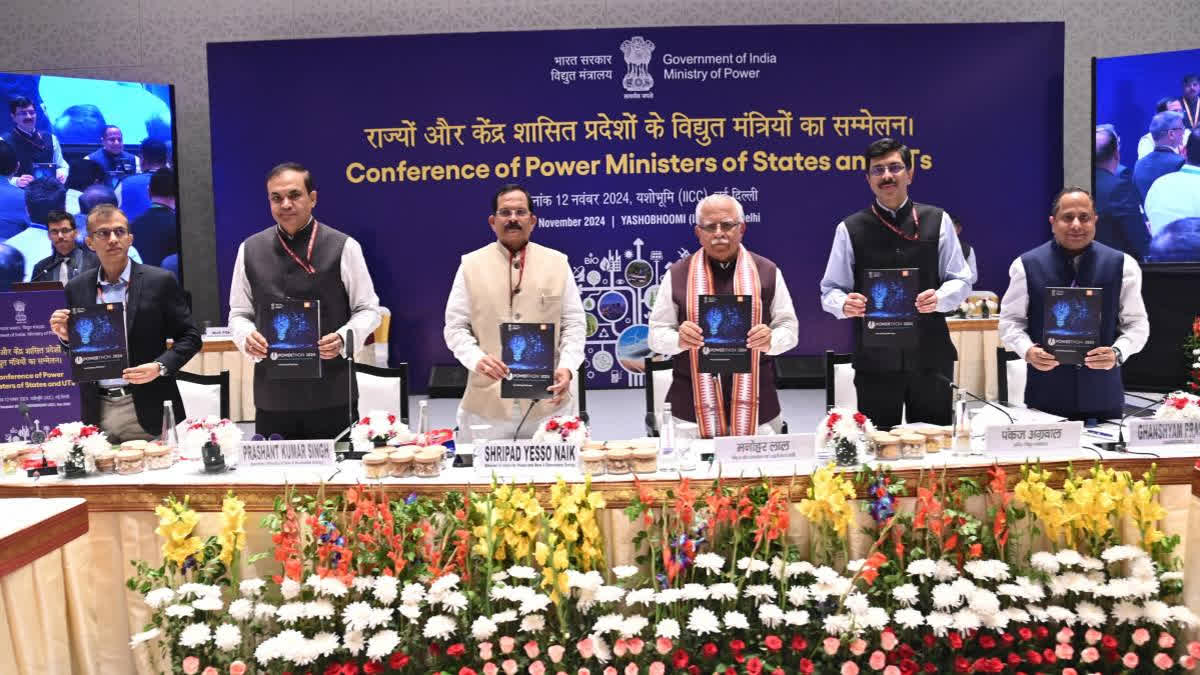New Delhi: Emphasising that the States need to ensure timely payment of government dues and power subsidies, Union Power Minister Manohar Lal on Tuesday asked them to establish a centralised mechanism for payment of government dues.
"For government dues, states may establish a centralised mechanism for payment of government dues and all government offices should be brought on prepaid smart meters by March 2025. States need to work on ways to reduce the DISCOM debts," he said while interacting with the power ministers from states and administrators from UTs during a national conference.
The conference was held on Tuesday here. Minister of State for Power and New and Renewable Energy (NRE) Shripad Yesso Naik was also present on the occasion. Jammu & Kashmir Chief Minister, three Deputy Chief Ministers and 12 Power Ministers of States attended the event along with Principal Secretaries of States, Secretary (Power), Secretary (MNRE) and UTs.
Manohar Lal said that to promote smart meters 5 per cent rebate may be provided by States to prepaid consumers and they must do effective consumer engagement.
He further mentioned that DISCOMs need to make efforts for expeditious implementation of works sanctioned under RDSS.
Referring to the issue of growing power demand, Manohar Lal said there is a growing need for investment in the sector and also a need to improve the operational efficiencies of the utilities in the sector for which States may identify and take up utilities for listing.
"Resource Adequacy is critical to meet the growing power demand and States need to tie up capacity as per the Resource Adequacy plan. States may also optimise their power purchase based on the complementarity of demand. Further, contingency plans to be also made for meeting the peace load during the high demand period," he said.
He also highlighted that his ministry needs to work with the Ministry of Coal on the rationalisation of the linkage of coal sources to thermal plants.
"For efficient disposal of fly ash, back-filling of abandoned coal mines needs to be taken up at the earliest. National merit order despatch may be followed so that the overall cost of supply to DISCOMs could be reduced," said Manohar Lal.
He further said that States should focus on Nuclear-based Power Plants. Stating that capacity is likely to grow from 8GW to 20 GW by 2032, he said that States which are away from the coal sources should consider setting up of Nuclear Power Plants at the sites where coal-based thermal power plants have completed their life.
He highlighted that capacity is to grow from around 5GW to 27 GW by 2032. "Power Ministry is supporting the installation of BESS capacity of 12 GWh under the Viability Gap Funding Scheme and that States should avoid levying any water-cess charges and other such charges on Power Generation," he said.
Stating that India has the largest synchronised grid at present, Manohar Lal said a robust transmission system needs to be in place for evacuation of the renewable power as per planned capacity.
"A comprehensive plan is also needed for intra-state transmission for at least 10 years in line with ISTS transmission lines. States to identify transmission projects for Green Energy Corridors Phase-III and adopt revised guidelines for payment of compensation in regard to RoW for transmission lines and resolve pending RoW issues at the earliest," he said.
He also mentioned that the use of technology should be leveraged in the power sector and necessary cybersecurity guidelines to be adhered to by the States.
Demand forecasting should be taken up on priority by the States taking into account the dynamic demand growth owing to the rising economy, he said.
"All States should ensure flexible operation of their coal-based power plants up to 40 per cent," Khattar said.
Shripad Yesso Naik said the Centre is committed to achieving 500 GW of non-fossil fuel power by 2030, enhancing energy storage solutions, and integrating more renewable energy into the grid.
"A comprehensive plan has already been finalised to address transmission requirements for evacuation of RE. However, in order to bring renewable energy to consumers, a comprehensive plan for intra-state transmission is also needed,” he said.
Naik requested States to periodically evaluate the development progress of their downstream networks to ensure alignment with the Interstate Transmission System (ISTS) network.




